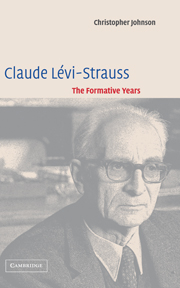Book contents
3 - From kinship to myth
Published online by Cambridge University Press: 05 June 2012
Summary
Le problème ethnologique est donc, en dernière analyse, un problème de communication.
(In the last analysis, therefore, the ethnological problem is a problem of communication.)Les problèmes d'ethnologie religieuse relèvent d'une psychologie intellectualiste.
(The problems of religious anthropology require an intellectualist psychology.)Had Lévi-Strauss ceased writing in 1950, after the publication of The Elementary Structures of Kinship, his contribution to anthropology would already have been a considerable one. The work brought to French anthropology an analysis of unprecedented scope and theoretical depth, and its effect outside France was to stimulate debate in kinship studies for the next two decades. It is therefore surprising, and interesting, that shortly after this monumental work appeared, Lévi-Strauss shifted the focus of his research away from kinship studies, to concentrate on the anthropology of religion. The cause of this somewhat abrupt change of specialization, according to Lévi-Strauss, was his move to the Ecole Pratique des Hautes Etudes in 1950, to take the chair in the history of religions previously occupied by Mauss, and more recently by Maurice Leenhardt. In a very short space of time, we are told, he found himself having to begin an entirely new field of study.
Professional and institutional factors were therefore decisive in determining Lévi-Strauss's change of specialization. But in another sense – and this is why the transition is an interesting one – they seem simply to have precipitated what was already a tendency, an internal dynamic of Lévi-Strauss's thinking during this period.
- Type
- Chapter
- Information
- Claude Lévi-StraussThe Formative Years, pp. 68 - 103Publisher: Cambridge University PressPrint publication year: 2003



